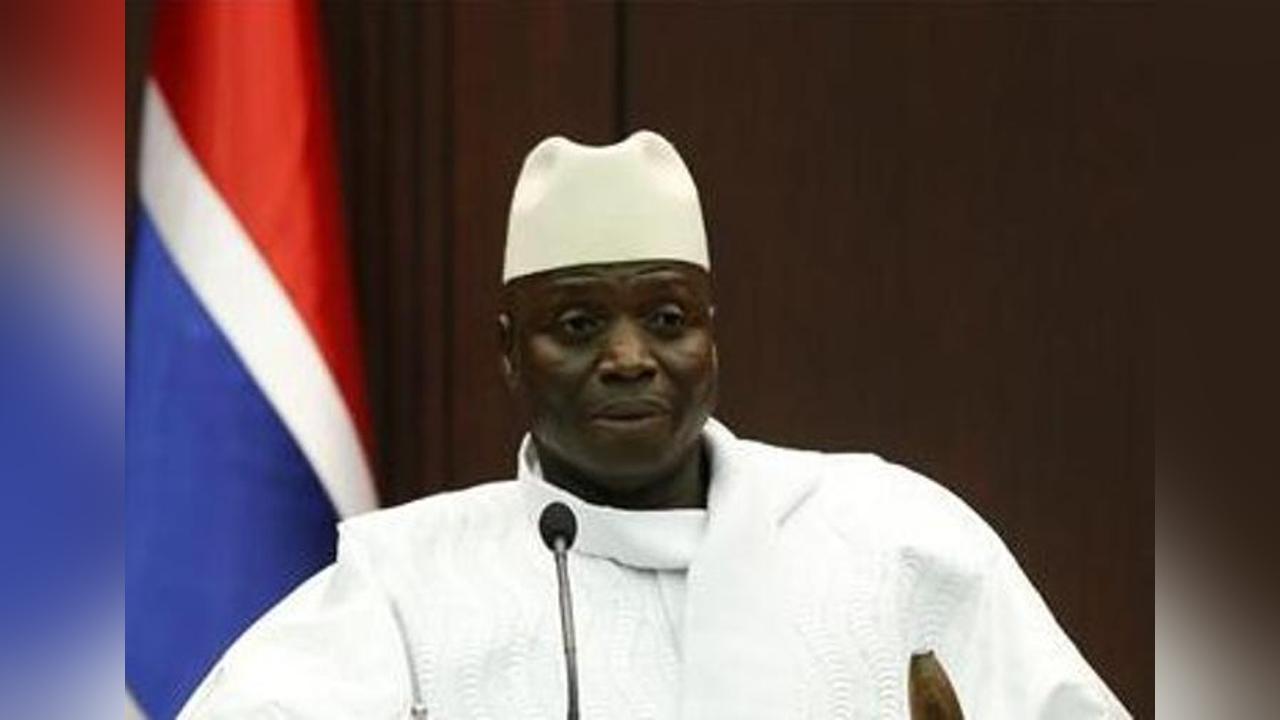Africa-Press – Gambia. In what can only be described as an explosion across the Gambian political landscape, the sudden release of multiple audio recordings by former President Yahya AJJ Jammeh on May 30, 2025, has added energy in the long-dormant yet inflammable national debate surrounding The Gambia’s unmaterialised promise of offshore oil riches. His assertions, delivered with characteristic fervour and theatrical cadence, have reverberated across the national consciousness, invoking visceral reactions from staunch supporters, seasoned critics, and dispassionate analysts alike.
At the heart of Jammeh’s audio revelations lies an incendiary allegation that neighboring Senegal is currently exploiting hydrocarbon resources from beneath the Sangomar field reserves which, he asserts with unflinching certainty, lie squarely within Gambian territorial waters. He places explicit blame for this purported betrayal on the United Democratic Party-led Coalition government that assumed power in 2016, particularly singling out its standard-bearer, Lawyer Ousainou Darboe, for what he decried as a “clandestine and reckless arrangement” with then-Senegalese President Macky Sall, a deal allegedly consummated between 2016 and 2019, and one which, in Jammeh’s telling, effectively relinquished The Gambia’s sovereign entitlement to its petro-wealth.
Strikingly, the former President contends that he possesses authoritative geological and groundbreaking data, commissioned through a Canadian exploration firm and facilitated, he claims, by two unnamed sons of the late Libyan leader Muammar Gaddafi, irrefutably confirming that the lucrative oil deposits currently being extracted by Senegal lie within The Gambia’s exclusive economic zone. He provocatively posits that the untapped reserves could rival the prodigious outputs of Saudi Arabia or the United Arab Emirates, thus hinting at a potential economic transformation that was, and remains, unjustly deferred.
Jammeh alleges he paid a staggering $4 million for these studies but severed ties with the Canadian entity after it purportedly proposed a grossly inequitable arrangement, offering The Gambia a mere 5% stake in its own oil wealth. However, his narrative falters in the face of hard scrutiny. He provides no documentary evidence, declines to name the Canadian firm, and still refuses to relinquish the data unless reinstated as president, a return widely dismissed as a political fantasy.
This caveat poses a deeply disconcerting question. If the data in question does exist, why was it neither disclosed during his presidency nor shared during his years in exile? More ominously, what becomes of this ostensibly critical national resource if its only custodian remains marooned in self-imposed exile in Equatorial Guinea?
Beyond the dramatic audio dispatches, credible voices have previously raised alarms over The Gambia’s murky petroleum dealings. Notably, in 2020, Captain Ebou Jallow alleged that a suspicious arrangement may have been brokered between the Barrow administration and Senegal—one that potentially ceded The Gambia’s rightful claim to its offshore blocks in a veil of political expediency and administrative misrepresentation.
These suspicions have since been reinforced by a meticulously detailed investigative report authored by Ousman F M’Bai, a London-based international asset recovery lawyer of considerable repute. M’Bai’s findings implicate FAR Ltd, the Australian firm entrusted with exploration responsibilities in the Senegalese-Gambian basin, in possible gross negligence, if not deliberate compromise, in safeguarding Gambian interests.
In an eloquent and widely disseminated article published just yesterday, the ever-enigmatic yet intellectually formidable public commentator Arac Remes Pacobii, who has explicitly distanced himself from being this author, issued a solemn clarion call under the title: “FOCUS 2026 GAMBIA – A CALL FOR PATRIOTISM AND ACCOUNTABILITY.”
Referencing Prime Minister Ousmane Sonko’s state visit to Banjul five months prior, Pacobii highlighted M’Bai’s affirmation that the MSGBC Basin’s hydrocarbon deposits straddle the maritime borders of both Senegal and The Gambia. This acknowledgment by Sonko, he argues, constitutes a legal and moral foundation upon which the Gambian state must urgently build a transparent and nationalist reclamation campaign.
Gambia’s offshore blocks A2 and A5, geologically contiguous with Senegal’s now-thriving Sangomar field, have yielded no tangible benefits to its citizenry. Pacobii ascribes this dismal outcome to a toxic alchemy of secretive international agreements, political complicity, and corporate chicanery involving foreign giants such as FAR Ltd., Woodside Energy, and Malaysia’s Petronas. These entities, he contends, were abetted by influential domestic actors, including legal operatives within the Bensouda network and senior officials in successive Gambian administrations.
His report paints a damning picture of critical geophysical data deliberately suppressed; fiscal conduits bypassing national oversight and collusive arrangements that may have effectively liquidated The Gambia’s legitimate share of its maritime wealth.
In response to these findings, Pacobii issues a patriotic imperative of which a national audit must be commissioned to scrutinise all petroleum-related agreements signed between 2017 and 2025. Those found culpable, whether public servants or private facilitators, must be held legally accountable for acts tantamount to economic sabotage.
He calls upon civil society, the media, and the wider citizenry to rise in concerted pressure against the Barrow administration, demanding a full-scale investigation aimed at restoring The Gambia’s sovereign control over its petroleum patrimony, if, indeed, it has been surreptitiously relinquished.
Thus, while Jammeh’s audio dramatic monologue may dominate the headlines with their intrigue and spectacle, the nation’s salvation lies not in theatrical revelations but in resolute, lawful pursuit of justice and restitution. Prime Minister Sonko’s diplomatic visit, though outwardly symbolic, now emerges as an inflection point, a quiet invitation to chart a new course of bilateral transparency and national redress.
For The Gambia, the moment has arrived not for nostalgic demagoguery, but for institutional fortitude. Not for sentimental tapes echoing from exile, but for firm-footed steps on sovereign soil, toward truth, accountability, and the long-overdue reclamation of a future mortgaged in silence.
For More News And Analysis About Gambia Follow Africa-Press






